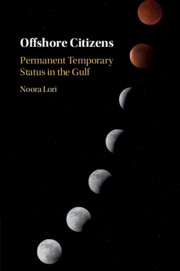Book contents
- Offshore Citizens
- Offshore Citizens
- Copyright page
- Contents
- Figures
- Tables
- Introduction
- 1 Limbo Statuses and Precarious Citizenship
- 2 Making the Nation: Citizens, “Guests,” and Ambiguous Legal Statuses
- 3 Demographic Growth, Migrant Policing, and Naturalization as a “National Security” Threat
- 4 Permanently Deportable: The Formal and Informal Institutions of the Kafāla System
- 5 “Taʿāl Bachir” (Come Tomorrow): The Politics of Waiting for Identity Papers
- 6 Identity Regularization and Passport Outsourcing: Turning Minorities into Foreigners
- 7 Conclusion
- Methodological Appendix
- References
- Index
2 - Making the Nation: Citizens, “Guests,” and Ambiguous Legal Statuses
Published online by Cambridge University Press: 05 August 2019
- Offshore Citizens
- Offshore Citizens
- Copyright page
- Contents
- Figures
- Tables
- Introduction
- 1 Limbo Statuses and Precarious Citizenship
- 2 Making the Nation: Citizens, “Guests,” and Ambiguous Legal Statuses
- 3 Demographic Growth, Migrant Policing, and Naturalization as a “National Security” Threat
- 4 Permanently Deportable: The Formal and Informal Institutions of the Kafāla System
- 5 “Taʿāl Bachir” (Come Tomorrow): The Politics of Waiting for Identity Papers
- 6 Identity Regularization and Passport Outsourcing: Turning Minorities into Foreigners
- 7 Conclusion
- Methodological Appendix
- References
- Index
Summary
This chapter provides the historical context for the creation of Emirati citizens, guest workers, and a gray zone of people who do not clearly fit into the state’s official citizen/alien binary. This historical analysis is used to illustrate how – in addition to creating citizens and noncitizens – national foundings and state formation processes also produce demographic boundary zones of ambiguously and conditionally included individuals. Using the British records to examine the creation of a common immigration and citizenship policy in the UAE, this chapter shows that ambiguous citizenship statuses emerged historically because of a disjuncture between the more restrictive incorporation practices of Abu Dhabi on the one hand, and the more expansive incorporation practices of the remaining emirates on the other. As Abu Dhabi has slowly monopolized its power over the federation, its more restrictive understanding of citizenship has been adopted as the national policy, creating gaps in the coverage of citizenship laws for minorities who were incorporated by the remaining emirates.
In the early state-building period, seven ruling tribes united under the leadership of Sheikh Zayed Al Nahyan, the ruler of Abu Dhabi. A state form was imposed on a set of political kinship structures, which immediately produced disputes over territory and border, citizen and noncitizen, allegiance and treason, and state nationalism and heterodox nationalisms. While the founding pact of the union granted the rulers of each emirate the authority to determine who is and is not a citizen, the Ministry of Interior (MOI) in Abu Dhabi now effectively controls this domain. Abu Dhabi constructed this hegemony over time at the federal level through oil, luck, leadership, wealth, and good initial starting conditions that only became useful at later and different conditions. The official primordial nationalism seen today with its procedural emphasis on bloodline and allegiance can be traced to this period of intense struggles over categorization.
- Type
- Chapter
- Information
- Offshore CitizensPermanent Temporary Status in the Gulf, pp. 50 - 96Publisher: Cambridge University PressPrint publication year: 2019



